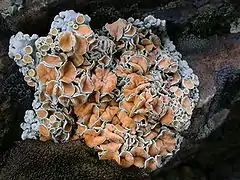Rhizoplaca chrysoleuca
Rhizoplaca chrysoleuca (rock-posy lichen, rockbright) is a pale yellowish-green to gray-green umbillicate foiliose lichen .[1][2] It was first described in 1791 by English botanist Sir James Edward Smith as Lichen chrysoleucus; Friedrich Wilhelm Zopf transferred it to the genus Rhizoplaca in 1905.
| Rhizoplaca chrysoleuca | |
|---|---|
 | |
| Scientific classification | |
| Kingdom: | |
| Division: | |
| Class: | |
| Order: | |
| Family: | |
| Genus: | |
| Species: | R. chrysoleuca |
| Binomial name | |
| Rhizoplaca chrysoleuca | |
| Synonyms | |
| |
The single-leaf (monophyllous) umbillicate thallus can be 2–3.5 cm in width, with deep lobes.[2] The thallus is relatively thick and lumpy with warts and lobules.[1] The fruiting structures (apothecia have lightly pruinose, burnt-orange to tan discs rimmed, with a contrasting rim of pale greenish thallus-like tissue making them easy to identify.[1] Apothecia are 0.8–2.5 mm diameter, and often numerous and crowded into each other.[2]
It grows in Eurasia and western North America. In the Sonoran Desert region it grows at elevations from 1,200 to 3,200 metres (3,900 to 10,500 ft).[2] It prefers siliceous rock, granite, schist, quartz, mica, and basalt, but is also found on sandstone and less commonly on calcareous rock.[2] It grows from the high desert to the alpine zone.[2] It is often nitrophilous,[2] preferring dropping areas under bird perches. It is common on rock in inland arid mountain and desert habitats in California.[1]:118
Lichen spot tests are K+ yellow or K-, KC+ yellow-orange, C-, and P- on the cortex, and K-, KC+ red or KC-, C-, and P+ yellow or P- on the medulla.[1]
References
- Field Guide to California Lichens, Stephen Sharnoff, Yale University Press, 2014, ISBN 978-0-300-19500-2
- Lichen Flora of the Greater Sonoran Desert Region, Vol 1, Nash, T.H., Ryan, B.D., Gries, C., Bugartz, F., (eds.) 2001,